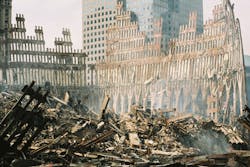9/11 Responders Face Higher Risk of Obstructive Sleep Apnea and PTSD
Those involved in the rescue and recovery efforts at Ground Zero are at a higher risk of obstructive sleep apnea and post-traumatic stress disorder because of their exposure to inhaled particular matter, according to research from the Icahn School of Medicine at Mount Sinai.
“Our study shows high exposure to the massive dust cloud of air pollution at Ground Zero has increased the risk among first responders of both obstructive sleep apnea and PTSD,” said Mary Ann McLaughlin, M.D., MPH, principal investigator for the WTC-Chest Program at Mount Sinai. “As a result, this puts our 9/11 first responders at higher risk of developing heart disease.”
First responders at Ground Zero were exposed to varying levels of air filled with cement dust, smoke, glass fibers and heavy metals. The WTC-CHEST Program at Mount Sinai previously has linked this exposure to lung, heart and kidney disease abnormalities.
Get a glimpse of safety from 1,776 feet in these One World Trade Center construction photos.
In two separate studies, the research team found further research evidence linking sleep apnea and PTSD to 9/11 particulate exposure.
In each of the two analyses, researchers studied the same WTC-CHEST Program population of more than 800 participants between January 2011 to September 2013 with varying exposure to particulate matter, taking into account each first responder's time of arrival, proximity, duration and level of exposure at Ground Zero.
“Elevated exposure to the particulate matter from 9/11 caused upper-airway inflammation and is a significant contributing factor to the pathogenesis of obstructive sleep apnea,” McLaughlin said. “There is strong evidence in our study data showing a significant risk of inhaled particulate matter exposure and risk of obstructed sleep apnea in the studied group of WTC first responders.”
In addition, researchers linked particulate-matter inhalation to a high risk of PTSD.
Study results show that those with very high or high exposure were more likely to have PTSD. Also, they found that those responders with PTSD had elevated biomarkers for increased cardiovascular-disease risk, including high sensitivity to C-reactive protein (hsCRP), a key biomarker of inflammation indicative of increased cardiovascular risk. Those WTC responders with PTSD had significantly higher hsCRP levels.
“High levels of exposure to particulate matter may lead to sleep apnea and PTSD, and as a result [are] a high risk factor for cardiovascular disease,” McLaughlin explained. “As a result of our new study findings, we plan to further closely monitor our WTC first responders for heart-disease warning signs.”
